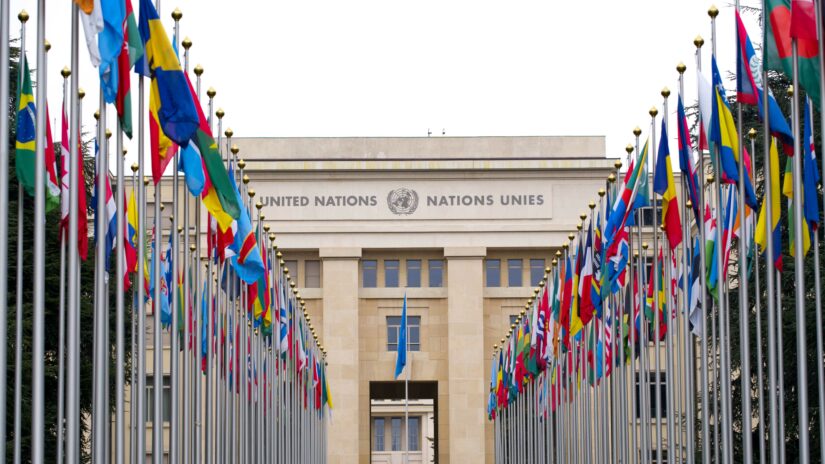An ambitious World Health Assembly aims to get global health back on track

The 76th World Health Assembly (WHA) was the first since the World Health Organization declared that COVID-19 was no longer a Public Health Emergency of International Concern. My WHA kicked off with IFPMA colleagues at the WHO Walk the Talk, which was a healthy start to a busy week ahead.
The agenda saw a focus on accelerating progress towards 2030 global health goals, while discussions on future pandemic preparedness remained high on the agenda. The whole IFPMA team were focused on ensuring the voice of the industry was heard, making two formal statements, speaking at around 25 events, and attending over 60 more.
Here are some of my reflections on this year’s WHA.
Pandemic prevention, preparedness, and response
While no formal decisions were taken, discussions around pandemic preparedness were central to the debate at this year’s WHO. Fact is that, in the response against COVID-19, science delivered. Working in partnership, companies were able to develop the first safe and effective vaccine in just 326 days after the WHO declared a pandemic, and others followed within weeks thanks to the innovation ecosystem and companies’ ability to access pathogen data.
Ambitious, action-oriented proposals like the 100 Days Mission – to be even faster developing medical countermeasures in a next pandemic – are not impossible, but we must take the lessons from the COVID-19 pandemic into any future global architecture. Do not compromise what worked well against COVID-19 – innovation and access to pathogens – but focus on what most needs to be improved: more equitable rollout.
The debate on this increased when the Bureau Draft of the INB Pandemic Accord was leaked online. IFPMA’s position is clear – we are concerned that proposals included in the draft Accord could undermine what worked well, and not really contribute to tackling inequity.
Ambitious, action-oriented proposals like the 100 Days Mission – to be even faster developing medical countermeasures in a next pandemic – are not impossible, but we must take the lessons from the COVID-19 pandemic into any future global architecture.
I was able to give a short statement at an important side event hosted by Norway and South Africa as a follow-up to the Medical Countermeasures (MCM) Conference held end of February in Johannesburg. This was also an opportunity to express concerns about any attempt to pre-empt the outcome of the INB and IHR negotiations by establishing an interim MCM platform, which could potentially prejudge the outcome of the formal negotiations.
Of course, we must address issues of equitable access, and the solutions will include supporting more diversity in manufacturing. But these initiatives will take time and require enablers such as skilled workforce, strong regulatory systems, and sustainable business models, none of which can be taken for granted short-term. It’s important to remember that, in the Berlin Declaration, embraced by the Developing Countries Manufacturing Network (DCVMN9) and BIO, the pharmaceutical industry has already committed to reserving an allocation of real-time production of vaccines, treatments, and diagnostics for priority populations in lower income countries and take measures to make them available and affordable.
But undermining the innovation ecosystem would undermine our ability to respond to future pandemics. We communicated this in our formal statement we delivered to the WHA.
Building resilient health systems and delivering Universal Health Coverage
UHC is fundamental to global health security, economic security, and health equity. Health systems must operate in ‘normal’ times and when the next pandemic strikes so that essential health services go uninterrupted. This includes for routine immunization, chronic conditions like NCDs, and communicable diseases like HIV and TB.
Our industry is deeply committed to advancing UHC by improving primary healthcare, ensuring adequate financing, and focusing on multistakeholder partnerships. We are actively working toward the UHC2030 Action Agenda and the private sector constituency’s 5 commitments so that no one is left behind. Worldwide, we participate in more than 250 collaborations with over 1100 diverse partners to advance UHC and the Sustainable Development Goals.
UHC is fundamental to global health security, economic security, and health equity.
During the WHA, we also celebrated Africa Day on 25 May and highlighted the ways in which our industry is partnering to accelerate UHC on the continent – including through R&D, building health workforce capacity, strengthening patient pathways at the primary healthcare level, and delivering preventative health services.
The commitment of young people to build back better
It was great to see so many youth delegates at the WHA. Young innovators are invested in the global health agenda, and we’re delighted to support the Africa Young Innovators for Health Award to support young people who are innovating to advance UHC in Africa. It was an honor to welcome distinguished Minister of Senegal, Awa Marie Coll-Seck, to celebrate the launch of the second edition of the awards.
Across all these areas, partnership remains a central theme. In his closing speech, it was encouraging to hear the WHA76 President and Deputy Prime Minister and Minister of Health for Malta, Chris Fearne, underscore the importance of engaging the pharmaceutical industry as a solutions partner for more equitable distribution and greater access to medicines and medical devices in future. We share this vision.
To get global health back on track, we must work together. This requires us to ‘join forces’ behind the ambitious goals that are central to improving global health – whether that by the 100 Days Mission and preparing for future pandemics or delivering on Universal Health Coverage and the Sustainable Development Goals.
Author






